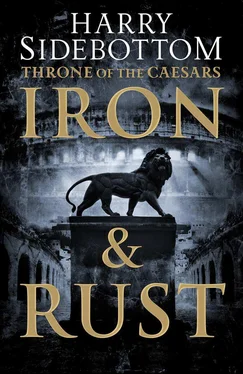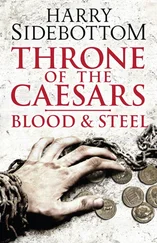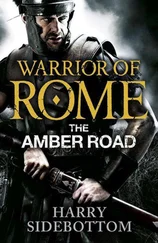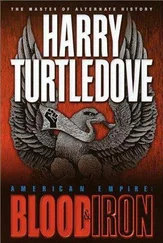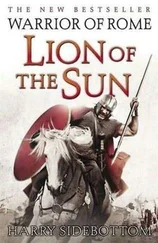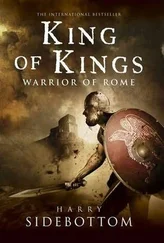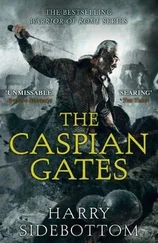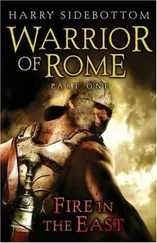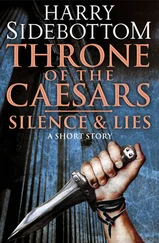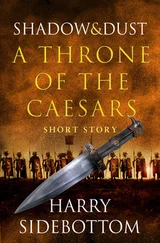Harry Sidebottom - Iron and Rust
Здесь есть возможность читать онлайн «Harry Sidebottom - Iron and Rust» — ознакомительный отрывок электронной книги совершенно бесплатно, а после прочтения отрывка купить полную версию. В некоторых случаях можно слушать аудио, скачать через торрент в формате fb2 и присутствует краткое содержание. Год выпуска: 2014, Издательство: HarperCollins Publishers, Жанр: Исторические приключения, на английском языке. Описание произведения, (предисловие) а так же отзывы посетителей доступны на портале библиотеки ЛибКат.
- Название:Iron and Rust
- Автор:
- Издательство:HarperCollins Publishers
- Жанр:
- Год:2014
- ISBN:нет данных
- Рейтинг книги:4 / 5. Голосов: 1
-
Избранное:Добавить в избранное
- Отзывы:
-
Ваша оценка:
- 80
- 1
- 2
- 3
- 4
- 5
Iron and Rust: краткое содержание, описание и аннотация
Предлагаем к чтению аннотацию, описание, краткое содержание или предисловие (зависит от того, что написал сам автор книги «Iron and Rust»). Если вы не нашли необходимую информацию о книге — напишите в комментариях, мы постараемся отыскать её.
Iron and Rust — читать онлайн ознакомительный отрывок
Ниже представлен текст книги, разбитый по страницам. Система сохранения места последней прочитанной страницы, позволяет с удобством читать онлайн бесплатно книгу «Iron and Rust», без необходимости каждый раз заново искать на чём Вы остановились. Поставьте закладку, и сможете в любой момент перейти на страницу, на которой закончили чтение.
Интервал:
Закладка:
After the cataphracts had thundered past, Maximinus felt the wound on the back of his head. It was nothing too bad. He wiped the blood from his hands on to his breeches. Stepping carefully, to avoid the arrowheads and spears strewn across the ground, he walked through the belt of trees and looked down the other side. Modestus and his men were riding hard to the east. The valley was filled with fleeing Germans. Those in the path of the Roman heavy cavalry were ridden down. Soon the routed warriors would reach the encampment. Amidst the wagons and terrified non-combatants, chaos would reign. The path to safety would be choked, impassable. When the Roman soldiers reached them, all would be slaughtered: the old, women and children. None would be spared, not even babes in arms. Maximinus felt no pity. He had waited all his adult life for revenge on this scale. These were different tribes, but all northern barbarians were the same. Born to deceit and cruelty, they were human only in form.
CHAPTER 16
Rome
The Forum Romanum,
Three Days before the Kalends of October, AD235
It was an auspicious day. Pupienus followed the newly inaugurated Consul out of the Senate house. To avert envy, he touched the toe of the statue of Libertas . He could not have been prouder, more happy. Marcus Clodius Pupienus Maximus, his elder son, was Consul of Rome. His small grandson would grow up the son of a Consul, the grandson of a Consul and, from next year — if the gods allowed — the nephew of a Consul. The child’s place among the nobility was secure. It no longer rested only on the personal favour of Septimius Severus, and that long-dead Emperor’s grant of patrician status to an ambitious young officer who had served him well against the barbarians, and even better in two vicious civil wars. It was the hard-earned culmination of a lifetime of endeavour. His grandson would never have to resort to the evasions and subterfuge that had marked his own life.
They processed down the steps and out into the Forum. It was true that his son was only a Suffect Consul, and that his term as one of the replacement chief magistrates had come later in the year than Honoratus had implied it would. But there had been many leading families that the regime had needed to conciliate. That Maximus’ colleague had had to enter into his Consulship in absentia concentrated all the honour in the eternal city on his son. As soon as it was framed, Pupienus regretted the selfish thought. He was delighted that his son had Crispinus as his colleague. He had written his friend a fulsome letter of congratulation. Crispinus was Consul and governor of Achaea. He may no longer command armies, as he had in Syria Phoenice, but a true Roman possessed the virtues of peace as well as war. Crispinus must not forget that he ruled over the birthplace of civilization, over the descendants of Pericles and Demosthenes. The Greeks may have fallen from the lofty heights of the past, but they deserved respect for the character and achievements of their ancestors.
Under the stern gaze of an equestrian statue of Septimius Severus, they made their stately way past the black stone where Romulus had ascended to the heavens. The plebs, out in reasonable numbers despite the chill autumn winds, cheered and moved back to open a passage.
The paintings were set up on enormous panels which stretched from the sanctuary of the Lake of Curtius to the Rostra. The figures on them were brightly coloured, larger than life. The action moved from left to right, drawing the eye straight to Maximinus. The Emperor rode a magnificent charger into a marsh. Barbarians floundered in the water around him: some fell mortally wounded or cowered in despair; others still resisted wildly. None of it did them any good. Roman soldiers followed their Imperator , hacking and stabbing, staining the mere with enemy blood. Above the chaos, Maximinus, clean-cut and handsome, seemed oddly indifferent to the slaughter.
In a break from tradition, Marcus Clodius Pupienus Maximus was to give the speech of thanks for his Consulship not in the Curia but here, before the freshly unveiled depiction of the triumph of his benefactor. As he started to speak, no one could doubt the panegyric nature of the ensuing words.
‘Our ancestors, in their wisdom, Conscript Fathers, laid down the excellent rule that a speech no less than course of action should commence with prayers.’
Pupienus had helped his son with the oration, and knew it off by heart. Half listening to the elegant phrases, he looked off to his left. On the pediment of the sanctuary another armoured horseman galloped into a watery place. The erection of the paintings of Maximinus had been in the charge of the ex-Consul Sabinus. The Consular was an intimate friend of Vopiscus, and so closely bound to the new regime. Sabinus was a man of culture. He would have given thought to their location, to their juxtaposition with the ancient monuments here in the sacred heart of Rome.
Pupienus looked from one rider to the other. In the statue, the horse of Curtius was head down, sinking. That of Maximinus was rearing, as if about to leap clear of the mud and reeds, to break free of the painting altogether and land on the Rostra. Some thought Curtius had been a Sabine warrior who had escaped death in battle at the hands of Romulus by putting his horse through the marsh that had once been in the Forum. Thoughts of defeat and enmity to Rome were unpromising. However, the Sabines had long become Roman, had formed the backbone of ancient legions. Perhaps the message was that Rome should embrace the Thracian Maximinus, who would bring his native courage to the battlefield.
Others considered Curtius a Roman equestrian who had sacrificed himself to the infernal gods for the good of Rome. Perhaps they might read Maximinus as another who had offered his life for Roman victory but, such were his virtues, the gods had spared him.
By coincidence, the Consul had moved to a passage mellifluously praising the Emperor as a new Aeneas, a Trojan saved by the provident deities to refound Rome.
Pupienus’ gaze tracked back over the paintings: Maximinus and the army crossed a bridge; under the eye of the commander the soldiers burnt a village, butchering the men, manhandling women and children; the surviving barbarians lurked in woods, before Maximinus led the charge into the marsh. The story had no ending. Victory looked inevitable, but the fighting was not done. At the time the messenger had arrived with the laurelled dispatch and the instructions for Sabinus, the war had continued. A second messenger had brought news of another great victory in a remote pass. Maximinus and his army were nearly back at the frontier. The Alamanni, Cherusci and countless other tribes had offered their surrender. But, given their perfidy, the Emperor was not minded to accept. He would winter at Castra Regina, repair the nearby forts, rest and refit the army, raise new levies, and in the spring he would again march into the North. There could be no peace with the Germans until their eradication. The lands as far as the ocean would be turned into a province. All who resisted would be killed.
Nothing good would come of this, Pupienus thought. As a young officer, he had seen action on the Rhine; as a senior commander, he had led men in Caledonia; and he had governed provinces on the Danube. There was nothing but hard marching and savage fighting with the northern barbarians. You could win battles, but none would prove decisive. The divine Augustus had attempted to conquer Germania. He had failed. The young prince Germanicus and the divine Emperor Marcus Aurelius had conceived the same bold intention and they had failed as well. Always the cry went up: Just one more campaign! Just another year! The elderly Emperor Tiberius may have been a tyrant, steeped in vice, but he had known how to deal with the tribes of the North. Send favoured chiefs sacks of coins, crates of fine tableware, amphorae of wine for them to pass on to their followers. When they failed to heed the commands of Rome, cut off the gifts and watch their men desert them. If one became over-mighty, set the surrounding tribes to pull him down. Should all else fail, send in the legions to burn a swathe through the forest, install a new chieftain and then return to the boundaries of the imperium . The Greeks were right: the Romans held all the world that was worth holding.
Читать дальшеИнтервал:
Закладка:
Похожие книги на «Iron and Rust»
Представляем Вашему вниманию похожие книги на «Iron and Rust» списком для выбора. Мы отобрали схожую по названию и смыслу литературу в надежде предоставить читателям больше вариантов отыскать новые, интересные, ещё непрочитанные произведения.
Обсуждение, отзывы о книге «Iron and Rust» и просто собственные мнения читателей. Оставьте ваши комментарии, напишите, что Вы думаете о произведении, его смысле или главных героях. Укажите что конкретно понравилось, а что нет, и почему Вы так считаете.
